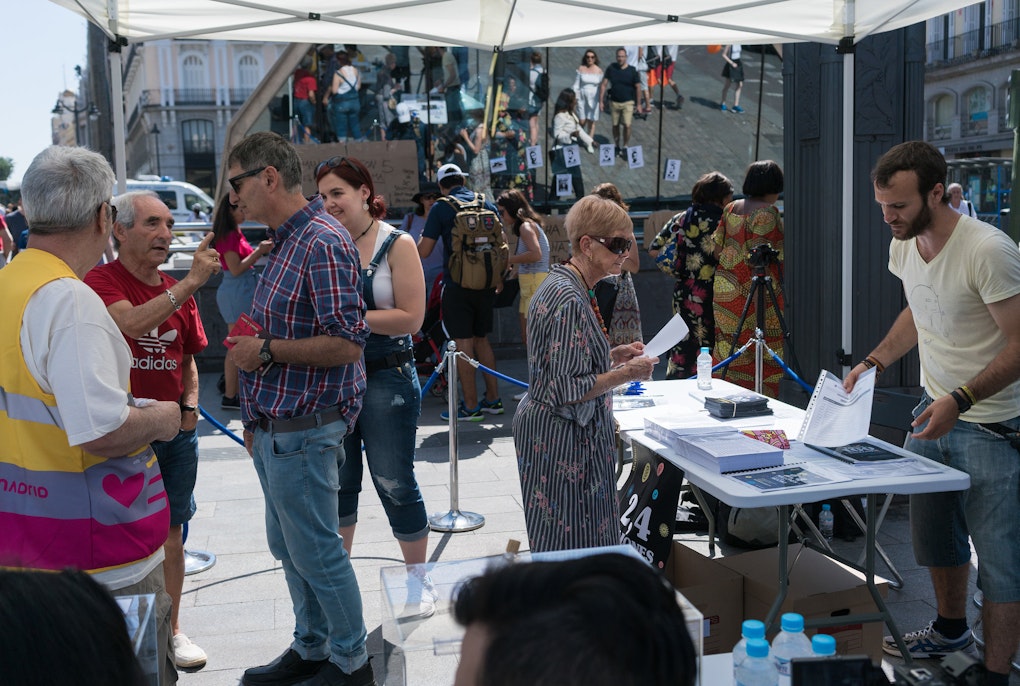
Citizen participation – reflecting on Spanish and Swiss practice
 Erika Schläppi
Erika Schläppi
The inspiration to write this blogpost came from the most unusual place: an email from Francesco Palermo sharing a comment of James Gardner on superheroes and liberal democracy in today’s America. Gardner was observing with dismay, the increased popularity of superheroes in the United States which led him to the impression that most citizens see “the solution to pressing problems not in cooperation and determined, laborious effort by mature adults (the liberal democracy way, let us say), but in strongmen who solve problems by violently smashing their enemies into submission”. Suddenly, evidence to support this hypothesis arrived from the most unexpected place, Venezuela, with the appearance of Súper Bigote -Super Mustache-, a superhero that looks alike President Maduro and uses his powers to protect the revolution by smashing its enemies -internal and external- by force.
When I saw the picture of Súper Bigote, I couldn’t help but to think of Superlópez, a Spanish comic figure from the 70s. Superlópez was conceived as a parody of Superman - he was a superhero that hardly had any superpowers and, most of the times, his solutions actually hindered the situation rather than fixing it. Despite this, Superlópez became a popular figure, that basically represents a cheap Spanish version of something trendy.
In any case, Gardner’s reflection, arguing that he could hardly imagine people choosing “Super Negotiator, who uses superhuman powers of empathy and conciliation to bring people together, or Captain Compromise, whose steely determination welds disparate interest groups into mutually half-satisfied but exhausted agreement” over the fierce and battle-hardened fighters that populate the movie screens got me thinking. If today's Spain is characterized by anything, it is the inability to weave agreements and the constant confrontation between the different political forces superimposed on a territorial conflict in the background that permeates everything. So does Gardner’s reflection transcend borders? And do most of the population prefer battle -if possible, overwhelming the enemy- to truce.
As disheartening as it may seem, reality seems to confirm the hypothesis advanced by Gardner. If, for instance, one looks at Spain’s main intergovernmental forum, the Conferencia de Presidentes, where the PM meets with the Presidents of the Autonomous Communities, the evidence is clear. Although this forum was conceived as an instrument to seek cooperation between the two levels of government, its functioning makes evident the main evil of Spain’s quasi-federal system: the absence of a federal culture. Take, for example, the last in-person meeting of the forum at the end of July 2021 in Salamanca. The weeks leading up to the meeting were marked by high political tension and cross accusations of a lack of loyalty between the central government and different Autonomous Communities. As usual, the central government unilaterally called the forum and decided the issues to be addressed, as well as the format the proceedings would take. This time, the time allocated to each Autonomous Community was just 5 minutes, which evidenced that the central government intended to use the meeting to inform the Autonomous Communities of its decisions instead of sitting down to negotiate and reach agreements with them. On the other hand, the summit was surrounded by the usual ‘unknown’, namely if the presidents of the Basque Country and Catalonia would attend or whether, once again, they would opt for boycotting the summit with a chaise vide policy in search of preferential -and privileged- bilateral treatment from the central executive.
As expected, the Catalan president refused to participate, claiming that he would only attend bilateral negotiations with the central state -which were granted a couple of months later-, but to the surprise of some and the anger of many, the Basque president finally did. But not before obtaining a commitment from the central executive to transfer the collection of several taxes to the Basque Country, enlarging the asymmetrical nature of territorial financing in Spain. This transfer was sealed the day before the summit, to avoid any backtracking or unfulfilled promises. As one can quickly see, the lesson to be drawn from this meeting is not a positive one in terms of federal culture; boycott and blackmail seem more likely to succeed than cooperation and loyalty.
The confrontation experienced at the Conferencia de Presidentes seems to be spreading to other fields. Take for example territorial financing. There you will see fifteen Autonomous Communities -as the Basque Country and Navarra have separate fiscal regimes and make little contribution to solidarity- arguing in public and striving for a slightly bigger piece of the cake than their counterparts, with Catalonia again opting for a boycott - arguing that the only negotiation it is interested in, is that of self-determination. It seems that not even when discussing territorial solidarity, a central feature of the Spanish territorial financing formula, even the slightest pinch of federal loyalty can be found.
As apocalyptic as this story may seem, the reality seems to be even more dark and perverse. The resurgence, once again, of the pandemic has given rise to the need to take new measures and to act in a coordinated manner, since it should not be forgotten that the Autonomous Communities are the ones that have the competencies in health. This has led to the necessity of multiple virtual meetings, most of them short noticed, due to the impossibility of meeting in-person. Unlike the Salamanca meeting, or many others prior to the outbreak of the pandemic, these meetings, held behind closed doors and with no publicity other than a brief press release, have been attended by all the Autonomous Communities. When the cameras are off and there is no need to overact to keep voters in line, it seems that there is in fact a path towards cooperation and indeed also on territorial financing. This only reinforces Gardner's thesis, which has been interiorized by Spain’s political actors by adapting their behavior to the voters’ preference for confrontation and “smashing the enemy” as this is more sellable than making concessions to build a compromise, as if cooperation and transparence were antithetical values.
This hypothesis will be tested again soon, and reality will dictate the verdict. Another in-person Conferencia de Presidentes is scheduled for the coming weeks in the recently struck volcanic island of La Palma in the Canary Islands. This will provide us with a new opportunity to see whether cooperation and federal loyalty are principles that still have some weight in the Spanish territorial model or if these principles have fallen victim to political tactics - the only hope for building trust and bringing all actors together being a Spanish version of Gardner’s Captain Compromise. However, the problem is that although I can think of a superhero with powers to stop a volcano -which finally ended its destructive eruption after three months at the end of December 2021- and put an end to the suffering of the people of La Palma, I can hardly imagine one that manages to get all the regional presidents to sit at the same table with the constructive attitudes needed to reach agreements that are not preceded by blackmail, threats, rewards or cross attacks. In the end, in the battle for supremacy, Súper Bigote seems set to prevail over Captain Compromise.
The present article is financed in the framework of the funding scheme “Seal of excellence” of the Autonomous Province of Bolzano/Bozen – South Tyrol, project DATE, Unique Project Code (CUP): D52F19000180003.

This content is licensed under a Creative Commons Attribution 4.0 International license.

 Erika Schläppi
Erika Schläppi Thabile Chonco-Spambo
Thabile Chonco-Spambo
 Rebecca Nelson
Rebecca Nelson